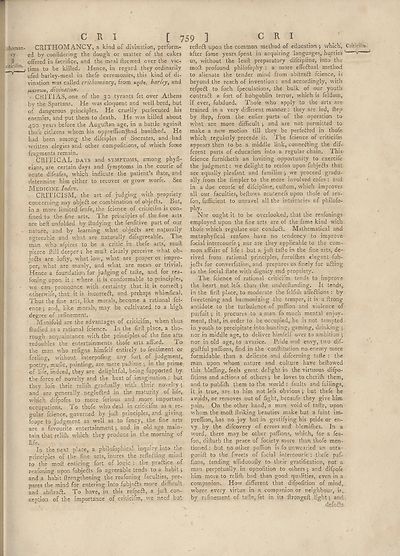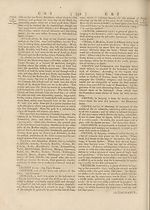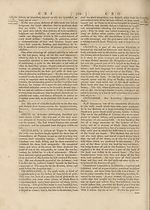Encyclopaedia Britannica, or, a Dictionary of arts, sciences, and miscellaneous literature : enlarged and improved. Illustrated with nearly six hundred engravings > Volume 6, CHI-Crystallization
(805) Page 759
Download files
Complete book:
Individual page:
Thumbnail gallery: Grid view | List view

c R I [ 759 ] C R I
ithoman- CRITHOMANCY, a kind of divination, perform-
cy ed by conddering the dough or matter of the cakes
. ji. offered in facrifice, and the meal ftrewed over the vic-
nticifm. ^ ^ii]ec}. Hence, in regard they ordinarily
ufed barley-meal in thefe ceremonies, this kind of di¬
vination was called crithomancy, from barley, and
fM'niM, divination.
CMTIAS, one of the 30 tyrants fet over Athens
by the Spartans. He was eloquent and well bred, but
of dangerous principles. He cruelly perfecuted his
enemies, and put them to death. He was killed about
400 years before the Auguftan age, in a battle againft
thofe citizens whom his oppreflionjhad bamlhed. He
had been among the difciples of Socrates, and had
written elegies and other compolitions, of which feme
fragments remain.
CRITICAL days and symptoms, among phyfi-
cians, are certain days and fymptoms in the courfe of
acute difeaies, which indicate the patient’s date, and
determine him either to recover or grow worfe. See
Medicine Index.
CRITICISM, the art of judging with propriety
concerning any obje£t or combination of objefls. But,
in a more limited lenfe, the fcience of criticifm is con¬
fined to the fine arts. The principles of the fine arts
are beft unfolded by lludymg the fenfitive part of our
- nature, and by learning what obje&s are naturally
agreeable and what are naturally difagreeable. The
man who afpires to be a critic in thefe arts, mud
pierce dill deeper : he mud clearly perceive what ob¬
jects are lofty, what low, what are proper or impro¬
per, what are manly, and what are mean or trivial.
Hence a foundation for judging of tade, and for. rea-
foning upon it : where it is conformable to principles,
we can pronounce with certainty that it is correct j
otherwife, that it is incorrect, and perhaps whimfical.
Thus the fine arts, like morals, become a rational fci¬
ence j and, like morals, may be cultivated to a high
degree of refinement.
Manifold are the advantages of criticifm, when thus
dudied as a rational fcience. In the fird place, a tho¬
rough acquaintance with the principles of the fine arts
redoubles the entertainments tnofe arts afford. I. o
the man who refigns himfeif entirely to fentiment or
feeling, without interpodng any fort of judgment,
poetry, mufic, painting, are mere padime j in the prime
of life, indeed, they are delightful, being {supported by
the force of novelty and the heat of imagination : but
they lofe their reliflu gradually with their novelty ;
and are generally neglefled in the maturity of life,
which difpofss to more ferious and more important
occupations. To thofe who deal in criticifm as a re¬
gular fcience, governed by jud principles, and giving
(cope to judgment as well as to fancy, the fine arts
are a favourite entertainment $ and in old age main¬
tain that reliih which they produce in the morning of
life.
In the next place, a philofophical inquiry into the
principles of the fine arts, inures the reflefting mind
to the mod enticing fort cf logic : the pradlice .of
reafoning upon fubjedls fo agreeanle tends to a habit j
and a habit drengthening the reafoning faculties, pre¬
pares the mind for entering into fubjedfs more difficult
and abdraef. To have, in this refpeff, a jud con¬
ception of the importance of criticifm, we need but
reflect upon the common method of education j which, Critieifnn.
after fome years fpent in acquiring languages, hurries ' y—
us, without the lead preparatory dilcipline, into the
mod profound philofophy : a more effedtual method
to alienate the tender mind from abdradt fcience, is
beyond the reach of invention : and accordingly, with
refpedt to fuch fpeculations, the bulk of our youth
contradl a fort of hobgoblin terror, which is feldom,
if ever, fubdued. Thofe who apply to the arts are
trained in a very different manner : they are led, dep
by dep, from the eafier parts of the operation to
what are more difficult j and are not permitted to
make a new motion till they be perfedted in thofe
which regularly precede it. The fcience of criticifm
appears then to be a middle link, connedting the dif¬
ferent parts of education into a regular chain. This
fcience furnidieth an inviting opportunity to exercife
the judgment: we delight to reafon upon fubjedts that
are equally pleafant and familiar ^ we proceed gradu¬
ally from the iimpler to the more involved cafes : and '
in a due courie of difeipline, cudom, which improves
all our faculties, bedows acutenefs upon thofe of rea¬
fon, fufficient to unravel all the intricacies of philofo-
phy. . .
Nor ought it to be overlooked, that the reafonings
employed upon the fine arts are of the fame kind with
thofe which regulate our condudl. Mathematical and
metaphyfical reafons have no tendency to improve
focial intercourfe $ nor are they applicable to the com¬
mon affairs of life : but a jud tafle in the fine arts, de¬
rived from rational principles, furnifhes elegant fub-
jedls for converfation, and prepares us finely for adling
in the focial date with dignity and propiiety.
The fcience of rational criticifm tends to improve
the heart not lefs than the underbanding. It tends,
in the fird place, to moderate the felfidi affeflions : by
fweetening and harmonizing the temper, it is a drong
antidote to the turbulence of paffion and violence of
purfuit ; it procures to a man fo much mental enjoy¬
ment, that, in order to be occupied, he is not tempted
in youth to precipitate into hunting, gaming, drinking ;
nor in middle a^e, to deliver himfclf over to ambition ;
nor in old age, to avarice. Pride and envy, two dif-
gudful paffions, find in the conditution no enemy more
formidable than a delicate and difeerning tade : the
man upon whom nature and culture have bedowed
this blefling, feels great delight in the virtuous difpo-
btions and aflions of others ■, he loves to cherifh them,
and to publifh them to the world : faults and failings,
it is true, are to him not lefs obvious ; but thefe he
avoids, or removes out of fight, becaufe they give him
pain. On the other hand, a man void of tade, upon
whom the mod bribing beauties make but a faint im-
preffion, has no joy but in gratifying his pride or en¬
vy by the difeovery of errors and blemidies. In a
word, there may be other paffions, which, for a fea-
fon, didurb the peace of fociety more than thofe men¬
tioned : but no other paffion is fo unwearied an anta~
gonid to the Tweets of facial intercourfe : thefe paf¬
fions, tending affiduoufly to their gratification, put a
man perpetually in oppofition to others ; and difpofe
him more to relifh bad than good qualities, even in a
companion. How different that difpofition of mind,
where every virtue in a companion or neighbour, is,
by refinement of tade, fet in its brongeb light; and.
defe£lr.
ithoman- CRITHOMANCY, a kind of divination, perform-
cy ed by conddering the dough or matter of the cakes
. ji. offered in facrifice, and the meal ftrewed over the vic-
nticifm. ^ ^ii]ec}. Hence, in regard they ordinarily
ufed barley-meal in thefe ceremonies, this kind of di¬
vination was called crithomancy, from barley, and
fM'niM, divination.
CMTIAS, one of the 30 tyrants fet over Athens
by the Spartans. He was eloquent and well bred, but
of dangerous principles. He cruelly perfecuted his
enemies, and put them to death. He was killed about
400 years before the Auguftan age, in a battle againft
thofe citizens whom his oppreflionjhad bamlhed. He
had been among the difciples of Socrates, and had
written elegies and other compolitions, of which feme
fragments remain.
CRITICAL days and symptoms, among phyfi-
cians, are certain days and fymptoms in the courfe of
acute difeaies, which indicate the patient’s date, and
determine him either to recover or grow worfe. See
Medicine Index.
CRITICISM, the art of judging with propriety
concerning any obje£t or combination of objefls. But,
in a more limited lenfe, the fcience of criticifm is con¬
fined to the fine arts. The principles of the fine arts
are beft unfolded by lludymg the fenfitive part of our
- nature, and by learning what obje&s are naturally
agreeable and what are naturally difagreeable. The
man who afpires to be a critic in thefe arts, mud
pierce dill deeper : he mud clearly perceive what ob¬
jects are lofty, what low, what are proper or impro¬
per, what are manly, and what are mean or trivial.
Hence a foundation for judging of tade, and for. rea-
foning upon it : where it is conformable to principles,
we can pronounce with certainty that it is correct j
otherwife, that it is incorrect, and perhaps whimfical.
Thus the fine arts, like morals, become a rational fci¬
ence j and, like morals, may be cultivated to a high
degree of refinement.
Manifold are the advantages of criticifm, when thus
dudied as a rational fcience. In the fird place, a tho¬
rough acquaintance with the principles of the fine arts
redoubles the entertainments tnofe arts afford. I. o
the man who refigns himfeif entirely to fentiment or
feeling, without interpodng any fort of judgment,
poetry, mufic, painting, are mere padime j in the prime
of life, indeed, they are delightful, being {supported by
the force of novelty and the heat of imagination : but
they lofe their reliflu gradually with their novelty ;
and are generally neglefled in the maturity of life,
which difpofss to more ferious and more important
occupations. To thofe who deal in criticifm as a re¬
gular fcience, governed by jud principles, and giving
(cope to judgment as well as to fancy, the fine arts
are a favourite entertainment $ and in old age main¬
tain that reliih which they produce in the morning of
life.
In the next place, a philofophical inquiry into the
principles of the fine arts, inures the reflefting mind
to the mod enticing fort cf logic : the pradlice .of
reafoning upon fubjedls fo agreeanle tends to a habit j
and a habit drengthening the reafoning faculties, pre¬
pares the mind for entering into fubjedfs more difficult
and abdraef. To have, in this refpeff, a jud con¬
ception of the importance of criticifm, we need but
reflect upon the common method of education j which, Critieifnn.
after fome years fpent in acquiring languages, hurries ' y—
us, without the lead preparatory dilcipline, into the
mod profound philofophy : a more effedtual method
to alienate the tender mind from abdradt fcience, is
beyond the reach of invention : and accordingly, with
refpedt to fuch fpeculations, the bulk of our youth
contradl a fort of hobgoblin terror, which is feldom,
if ever, fubdued. Thofe who apply to the arts are
trained in a very different manner : they are led, dep
by dep, from the eafier parts of the operation to
what are more difficult j and are not permitted to
make a new motion till they be perfedted in thofe
which regularly precede it. The fcience of criticifm
appears then to be a middle link, connedting the dif¬
ferent parts of education into a regular chain. This
fcience furnidieth an inviting opportunity to exercife
the judgment: we delight to reafon upon fubjedts that
are equally pleafant and familiar ^ we proceed gradu¬
ally from the iimpler to the more involved cafes : and '
in a due courie of difeipline, cudom, which improves
all our faculties, bedows acutenefs upon thofe of rea¬
fon, fufficient to unravel all the intricacies of philofo-
phy. . .
Nor ought it to be overlooked, that the reafonings
employed upon the fine arts are of the fame kind with
thofe which regulate our condudl. Mathematical and
metaphyfical reafons have no tendency to improve
focial intercourfe $ nor are they applicable to the com¬
mon affairs of life : but a jud tafle in the fine arts, de¬
rived from rational principles, furnifhes elegant fub-
jedls for converfation, and prepares us finely for adling
in the focial date with dignity and propiiety.
The fcience of rational criticifm tends to improve
the heart not lefs than the underbanding. It tends,
in the fird place, to moderate the felfidi affeflions : by
fweetening and harmonizing the temper, it is a drong
antidote to the turbulence of paffion and violence of
purfuit ; it procures to a man fo much mental enjoy¬
ment, that, in order to be occupied, he is not tempted
in youth to precipitate into hunting, gaming, drinking ;
nor in middle a^e, to deliver himfclf over to ambition ;
nor in old age, to avarice. Pride and envy, two dif-
gudful paffions, find in the conditution no enemy more
formidable than a delicate and difeerning tade : the
man upon whom nature and culture have bedowed
this blefling, feels great delight in the virtuous difpo-
btions and aflions of others ■, he loves to cherifh them,
and to publifh them to the world : faults and failings,
it is true, are to him not lefs obvious ; but thefe he
avoids, or removes out of fight, becaufe they give him
pain. On the other hand, a man void of tade, upon
whom the mod bribing beauties make but a faint im-
preffion, has no joy but in gratifying his pride or en¬
vy by the difeovery of errors and blemidies. In a
word, there may be other paffions, which, for a fea-
fon, didurb the peace of fociety more than thofe men¬
tioned : but no other paffion is fo unwearied an anta~
gonid to the Tweets of facial intercourfe : thefe paf¬
fions, tending affiduoufly to their gratification, put a
man perpetually in oppofition to others ; and difpofe
him more to relifh bad than good qualities, even in a
companion. How different that difpofition of mind,
where every virtue in a companion or neighbour, is,
by refinement of tade, fet in its brongeb light; and.
defe£lr.
Set display mode to:
![]() Universal Viewer |
Universal Viewer | ![]() Mirador |
Large image | Transcription
Mirador |
Large image | Transcription
Images and transcriptions on this page, including medium image downloads, may be used under the Creative Commons Attribution 4.0 International Licence unless otherwise stated. ![]()
| Permanent URL | https://digital.nls.uk/193017888 |
|---|
| Attribution and copyright: |
|
|---|
| Description | Ten editions of 'Encyclopaedia Britannica', issued from 1768-1903, in 231 volumes. Originally issued in 100 weekly parts (3 volumes) between 1768 and 1771 by publishers: Colin Macfarquhar and Andrew Bell (Edinburgh); editor: William Smellie: engraver: Andrew Bell. Expanded editions in the 19th century featured more volumes and contributions from leading experts in their fields. Managed and published in Edinburgh up to the 9th edition (25 volumes, from 1875-1889); the 10th edition (1902-1903) re-issued the 9th edition, with 11 supplementary volumes. |
|---|---|
| Additional NLS resources: |
|

